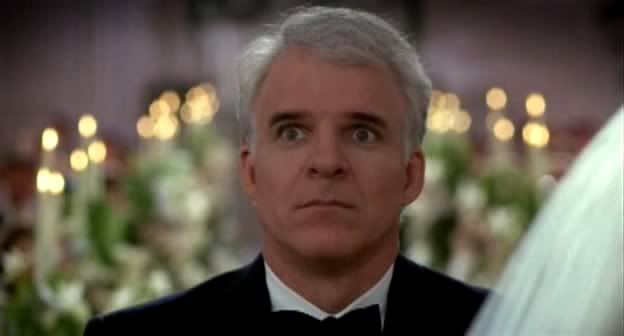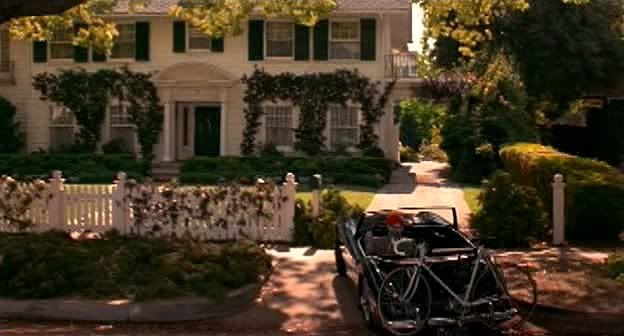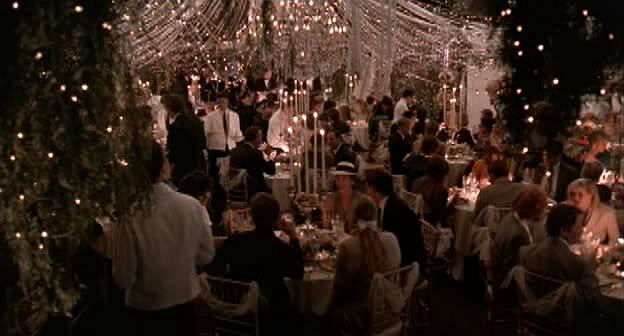Father of the Bride tells the most important wedding story of all: the story of masculinity in peril.

It’s a remake of a 1950 movie starring Spencer Tracy. Never having seen it, I don’t really know what the original movie is like. But I do know some of the things that happened in the United States between 1950 and 1991. A sampling: Hormonal birth control! The Feminine Mystique! Title VII! Legal abortion! Title IX! A woman on the Supreme Court! Three seasons of Murphy Brown!
But you’d never guess from this movie. There are two major themes:
1. Steve Martin freaking out over losing control over his daughter to her husband-to-be.
2. Steve Martin freaking out over how expensive the wedding is.
Because losing control over a woman and losing thousands of dollars mean that Steve Martin is losing his manhood, and therefore losing what makes life worth living.
Perhaps surprisingly, I have less to say about the first theme. It’s played so arch that I think it successfully crosses over into successful parody. I certainly laughed out loud when Steve Martin envisions his 22-year-old daughter as an adorable 7-year-old as she describes how wonderful and brilliant her fiancé is. It’s a little less funny when you contrast his “you’re still my baby” treatment of his grown woman daughter with his interaction with his ten-year-old Culkin son, whom he regards as a peer. He does not trust his adult daughter to decide whether she needs to wear a jacket, but he trusts his small boy son to re-park dozens of guests’ cars during the reception.
Disturbing, but still I found myself much more rankled about the “dear lord the cost of weddings!” plotline. Now, I understand from personal experience that even people with privilege can/should/do worry about their wedding budget. But I still think it is kind of offensively off-putting that the masses are asked to relate to the wedding budget panic of the driver of that Aston Martin and owner of that house:

The first ten minutes of the movie outline how comfortable Steve Martin’s lifestyle is: He’s got a laughably improbably successful sneaker manufacturing business, with the whitest, least-sweatshop-esque factory in the history of athletic footwear. He’s got the aforepictured Aston Martin and big house with a white picket fence in picturesque San Marino, California (Southern Californian cities named after European microstates: definitely dead center middle class, right?). He’s sent his daughter to Rome to study for her Masters in architecture, but she still lives at home when she isn’t abroad.
However will this family afford a wedding?!?!
Perhaps they could ask the groom’s family for assistance? They do live in Bel Air after all. They are, by Steve Martin’s estimation, rich people. But he also thinks that it is truly offensive for them to offer to help pay for the wedding. He’s the father of the bride, after all! How dare they take away his problems like that?
Or maybe they shouldn’t hire Martin Short’s wedding planner, Franck, of ambiguous European origin and not-so-ambiguous sexuality. Gay wedding planners = instant comedy! They can recognize fabrics! They wear turtlenecks! They pronounce “cake” like “cock!” And they incorporate new expenses into weddings, like tulip beds, live swans, and Chiavari chairs.

What really happens is that Steve Martin is told by Diane Keaton, his better half, that all his money panic is taking little pieces of his daughter’s happiness away. So he shuts his mouth and lets the money fly, returning to his core obsession of losing his little girl. And then the wedding reception is so busy he doesn’t even see his daughter off. But she calls from the airport to tell her dad she still loves him.
Moral of the story? You can buy your daughter’s love. Even after she has a husband. Rich white men of the world, relax! It’s all good.


May 17, 2010 at 8:58 pm
Love the review! (And, still love the movie). I never made the connection before between Steve Martin’s treatment of his daughter as compared to the treatment of his son as a peer. Good insights!
Also, I finally checked out A Practical Wedding. All I can say is that I am glad I did not discover it during finals because I would not have studied at all. I love that site!
May 18, 2010 at 4:47 pm
I am also glad for the sake of your grades you didn’t check out the site until after finals. The wedding graduates entries regularly make me cry. Enjoy!
May 17, 2010 at 10:59 pm
Going to agree with Kayleigh- did not even draw the connection between SM’s relationship with his daughter and that with his son.
Love these reviews!
May 18, 2010 at 4:47 pm
Thank you!
May 18, 2010 at 9:49 am
This review is dead on (and hilarious!!). I’ve seen the 1950s version, and you’re right: you wouldn’t know 40 years had changed anything… except that the spat the daughter has w/her fiance is different (if I remember right, in the ’50s one, they fight about honeymooning in Alaska or something).
I think this movie scarred me when I was younger; I remember thinking how ridiculous all that $$ and effort seemed for one day, and also how weird the father/daughter relationship seemed (my dad passed away 3 years ago; even though we were really close, I can’t imagine him freaking out about losing his “little girl” to some MAN!), esp, as you said, compared to how he treated his son.
>Gay wedding planners = instant comedy! They >can recognize fabrics! They wear turtlenecks! >They pronounce “cake” like “cock!”
It wouldn’t surprise me if that was a verbatim statement from the producers, LOL.
May 18, 2010 at 4:53 pm
Thanks for reminding me of something I wanted to mention in the review but failed to: the bride actually plays some lip service to feminism by A) including her fiance’s support of her dreams in her list of reasons he is amazing. B) Having her almost call off the wedding when he buys her a blender, worried it means he wants her to be a Stepford Wife. This didn’t really do much for me, because it is so second-wave, self-centered, and limited, and because no one else in the movie really listens to her. Her “feminism” is treated as a character quirk.
May 18, 2010 at 1:11 pm
I had a feeling your review might blow my childhood memories of this movie to pieces. I was right. I probably haven’t seen this since 1991 (when I enjoyed it. In my defense, I was 11. And I did and always will love Steve Martin. Except for Shopgirl and now this.) Oh dear me, the privilege. And the gender issues. And everything else.
Though you didn’t touch on the part that I still remember – Steve Martin’s initial desire for a backyard barbecue wedding. That fantasy/dream sequence was all-around awesome: hamburgers! Long tables! Fun! So much better than Crystan and chivari chairs! (and it looks a lot closer to my wedding than anything else in this movie.) However, it was dismissed as not-remotely-acceptable by everyone but the Dad. Boo. I think Hollywood needs more celebrations of simple backyard weddings.
Odd. Apparently at age 11 I had an affinity for casual backyard events too.
May 18, 2010 at 2:28 pm
The Steak Pit!!!!
May 18, 2010 at 4:56 pm
I liked that scene too! Bride burger and groom burger!
And I wanted to mention somewhere in this post how much I love Steve Martin, but I can’t give him a pass on everything. Shopgirl is another movie (I didn’t read the book) that I enjoyed watching, but didn’t like the message. I sort of wanted to send Steve Martin a letter asking if he really thinks that is what women are like and how relationships should go.
June 2, 2010 at 5:22 pm
I love this movie. I never really though Franc was gay, just European. I swear, I’m not an idiot, I just know too many strange, straight European men.
Interesting point about the relationship with the daughter and the son. It always kind of put me off, but I wasn’t sure why.
As far as the finances go though, yes, they are comfortably well off. But the wedding is $250 per person, for something like 500 people, in 1991. I don’t care if you’re Rockefeller, that’s INSANE.
Plus, as the child of rich-but-cheap parents who were ASTOUNDED that average, nice, weddings cost the same as a year of private college tuition (and some of our annual salaries), I found George’s freakouts to be totally realistic. There is this line about “my first car didn’t cost $900″ which is what the cake cost. My parents finally upgraded my sister’s mattress from a roll-away bed they bough at goodwill to a nice mattress when she was 15 (rich but cheap, seriously), and my father told everyone for MONTHS that her mattress cost more than his first car and second car, combined.
Weddings cost a lot and unless you regularly throw fancy catered parties, nobody expects that.
June 20, 2017 at 2:10 pm
“As far as the finances go though, yes, they are comfortably well off. But the wedding is $250 per person, for something like 500 people, in 1991. I don’t care if you’re Rockefeller, that’s INSANE.”
Yes, it is insane that anyone would think this is a reasonable amount to spend. I got married in 1992. Just under 100 guests. Total cost, including invitations and my beautiful dress, was under $10K, in a suburb of Chicago. People said it was one of the loveliest, most enjoyable weddings they’d ever attended, and I believe them. Would that people gave as much thought and planning to *how to be a married couple* as they do to the wedding.
June 22, 2010 at 2:47 am
I absolutely love this movie. I never saw anything negative about it, just enjoyed it on its face value.
For me, it was about Steve Martin freaking out that his oldest child was getting married (and the daughter part, obvs) and didn’t need him anymore. It’d be a big change, I think.
I like that they came to terms with it in the end, too.